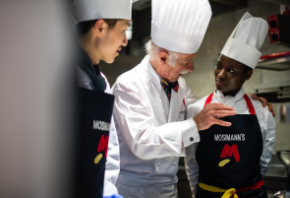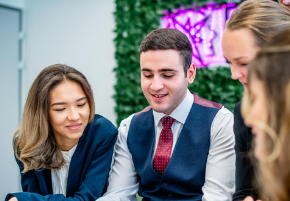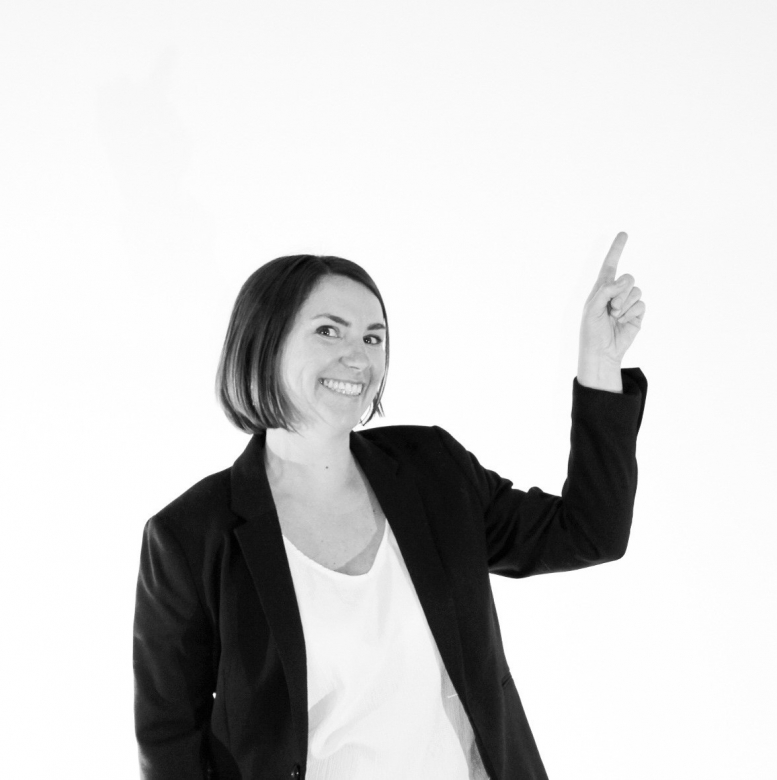- About
- Programs
- Innovation & Research
- Campus Life
- Career Services
- Admissions
- News & Events
- Alumni
Business Beyond Big Ideas
Business Beyond Big Ideas
Delphine Genin is teaching business from a marketing perspective
Delphine Genin has some unconventional teaching methods, to say the least.
As a student, she always felt that school was not made for her. Suffering from dyslexia, she struggled in the rigid system that allowed for only one, narrow means of learning. By the age of fourteen, she began to understand the rules of the game – academic success is on based your ability to understand and to meet teachers’ expectations, not necessarily to master the subject you are taught. Once you grasp what these expectations are, you can deliver accordingly. This doesn’t mean you have gained the important learning outcomes.
But in real life, ‘doing what’s expected of you’ is not what drives success.
Surprisingly, Delphine’s creative teaching tactics stem from her experience in marketing. It was working on the marketing team at L’Oréal and Procter & Gamble that she learned to take a consumer-centric approach - to market effectively, you must, first and foremost, understand your consumer and their wants and needs are. It’s an approach founded on empathy, requiring you to put yourself in other people’s shoes, and this is the method she applies to teaching. If you try to understand what and why students want to learn, she points out, you can create the space and give them the incentive to do so – from there, they will do the work.
‘Doing what’s expected of you’ is not what drives success.
Delphine began her work with César Ritz Colleges as a consultant on efficient learning. Eventually, she began to lecture and became one of the forces that contributed to shaping the school’s experiential approach to learning. She tells us about how she implements her teaching methods in her Business Plan class, and how she hopes to prepare her students to navigate the constantly-changing business world.
What are some of the ways you help students formulate their own business ideas?
I always tell my students, ‘don’t start with a big idea,’ which is confusing for a lot of people. Everyone thinks that this is exactly what you need for a business to work, but actually, the best businesses start with empathy. We use this approach in Design Thinking – start by learning about your audience, then start figuring out what the product should be. By being empathetic, you step out of your own worldview and broaden your perspective – this can only lead to new ideas and innovation!
The combination of logic and intuition is much more likely to lead to a successful business idea.
A lot of us are used to associating ourselves with one way of thinking – saying “I’m creative, I follow my gut instinct,” or “I prefer to use facts and logic to find an answer.” But Dr. Tara Swart’s Brain Agility Model demonstrates that the best way to improve your performance is to use multiple ways of thinking at once. Students need to use their intuition, and I encourage that. But I also tell them to back that up with research, data analyses, and to have conversations with their audiences. The combination of logic and intuition is much more likely to lead to a successful business idea.
What are some of the new and emerging business models on the culinary scene?
Of course, the stay-at-home economy is on the rise, so businesses are having to reinvent themselves. For example, the White Rabbit in Moscow has found a way to create a fine-dining experience at home. People receive a box at their door with the elements of each dish neatly packaged. They then have a call with the chef, who guides them through the plating of each dish and explains the ingredients and how they work together to create a particular flavor experience.
What people also want right now is to forget that there even is a pandemic. In response to this desire, Greece is looking into creating a COVID- free zone – an island where everyone is tested, and you can go on holiday in a place where there is no COVID at all.
During the pandemic, we were able to see how much we value our world and our experiences.
An emerging trend is going to be purpose.
My humble understanding is that an emerging trend is going to be purpose. I think that people will be going out less because the value of eating at a restaurant or going on holiday has gone up. If we’re going to go out, it needs to mean more, to feel special. If there’s a risk involved in us partaking in something, the activity needs to be worth that risk and bring value to our lives.
What are some of the biggest ethical dilemmas in the business world right now, and how do you and your students engage with these?
A major topic that we target in class is corruption. We look at how corruption originates, and it’s always linked to power. The students will then take a “Doing Business Without Bribery” course that will earn them a certification from the UN.
In the business world, things are never as simple as you might expect. In my students, what I see is a strong urge to do the right thing. A lot of them are concerned with sustainability or have the desire to make a difference in the world by creating something meaningful. They have the vision, but often lack the ethical tools that will help them do the right thing when faced with complicated situations. These are what I aim to equip them with.
What do you hope the students leave your class with?
I hope they leave with the confidence to go ahead and try something in entrepreneurship. That’s my favorite thing, hearing that a student went ahead, took a risk, and brought their idea to life. That drives me, as a teacher.
Discover why play is crucial to teaching.
#Faculty






















